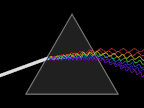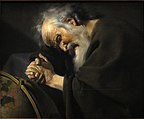Heraclitus
(c.535 BC - 475 BC) was a Greek philosopher, known for his doctrine of change being central to the universe, and for establishing the term Logos (λόγος) in Western philosophy as meaning both the source and fundamental order of the Cosmos.- Πάντα ῥεῖ καὶ οὐδὲν μένει
- Everything flows, nothing stands still.
- Quoted by Plato in Cratylus, and by Diogenes Laërtius in Lives of the Philosophers Book IX, section 8
- Variant translations:
Everything flows and nothing stays.
Everything flows and nothing abides.
Everything gives way and nothing stays fixed.
Everything flows; nothing remains.
All is flux, nothing is stationary.
All is flux, nothing stays still.
All flows, nothing stays.
- Nothing endures but change.
- From Lives of the Philosophers by Diogenes Laertius
- Variant translations:
There is nothing permanent except change.
Nothing is permanent except change.
The only constant is change.
Change is the only constant.
Change alone is unchanging.
- Eternity is a child playing, playing checkers; the kingdom belongs to a child.
- Quoted in Hippolytus, as translated in Reality (1994), by Carl Avren Levenson and Jonathan Westphal, p. 10
- Variant translations:
- History is a child building a sand-castle by the sea, and that child is the whole majesty of man’s power in the world.
- As quoted in Contemporary Literature in Translation (1976), p. 21
- A lifetime is a child playing, playing checkers; the kingdom belongs to a child.
- As quoted in The Beginning of All Wisdom : Timeless Advice from the Ancient Greeks (2003) by Steven Stavropoulos, p. 95
- Time is a game played beautifully by children.
- As quoted in Fragments (2001) translated by Brooks Haxton
- Lifetime is a child at play, moving pieces in a game. Kingship belongs to the child.
- As quoted in The Art and Thought of Heraclitus (1979) translated by Charles H. Kahn
- It is harder to fight pleasure than to fight emotion.
- Quoted by Aristotle in Nicomachean Ethics, Book III.
Further reading
- Fragments - The Collected Wisdom of HERACLITUS, Translated by Brooks Haxton, Viking, New York, 2001 ISBN 0-670-89195-9
- Magnus, Magus, Heraclitean Pride, Introduction by Wolfgang Fuchs, Furniture Press, Towson 2010 ISBN 978-098262992-5
External links
- Heraclitus at the Internet Encyclopedia of Philosophy
- Heraclitus at Greek Philosophy at Washington State University - broken link as of 15 April 2012
- The Flux and Fire Philosophy of Heraclitus
- Heraclitus Fragments in Greek (Unicode) and English
- Heraclitus: The Complete Fragments, William Harris (translator), Greek and English (DK numbers) with commentary (PDF file)
- Fragments of Heraclitus parallel Greek with links to Perseus, French, and English
- Heraclitus Bilingual Anthology (in Greek and English, side by side)
- Heraclitus of Ephesus by Giannis Stamatellos
Source:
Heraclitus - Wikiquote
http://en.wikiquote.org/wiki/Heraclitus





No comments:
Post a Comment